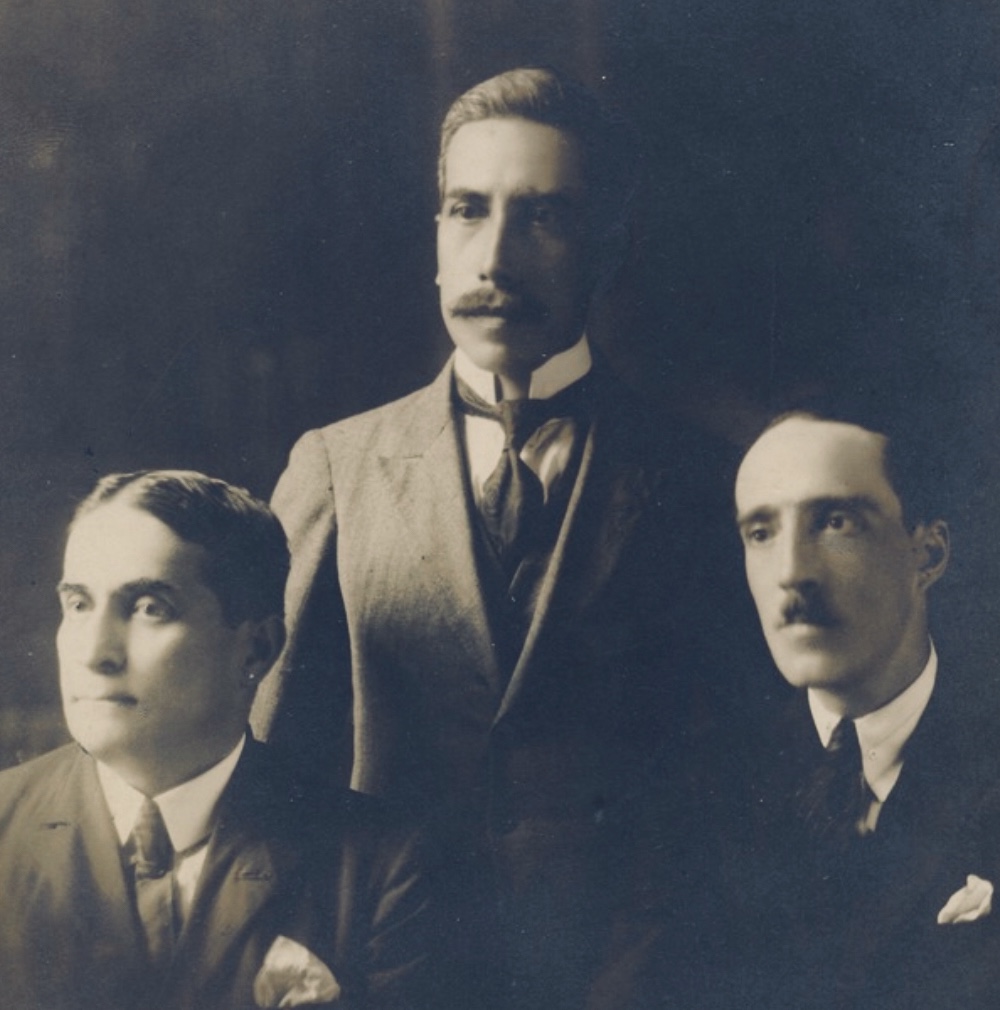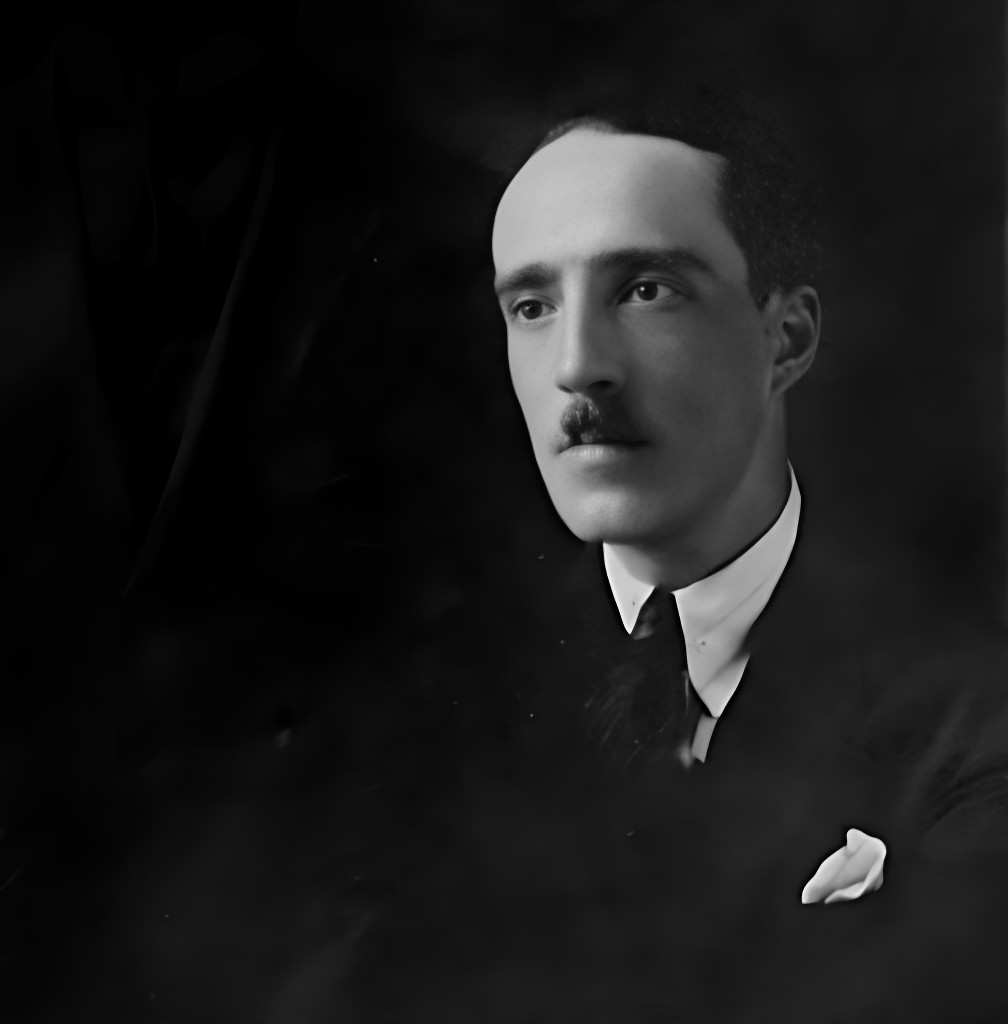Ernesto Noboa y Caamaño (Guayaquil, August 2, 1889 – Quito, December 7, 1927) was an Ecuadorian poet. Together with Arturo Borja, Humberto Fierro and Medardo Ángel Silva, Noboa was part of the group of poets known as the “Decapitated Generation,” so called for the premature death of its members. This group represents the apogee of the modernismo literary movement in Ecuador. Almost all of Noboa’s work, marked by anxiety and loathing, was collected in a book entitled “Romanza de las Horas” (Romance of the Hours), published in 1922. For some, his poem “Emoción vesperal” (Vesperal Emotion) marked a new era of poetry in Ecuador. The poem, which speaks about taking an afternoon trip to sea without a set course, with sorrow dying as the day dies out, is an allegory for death. He is one of the most read poets in Ecuador, and many of his poems are recited and sung by the people.
Early Life and Education
Ernesto Noboa y Caamaño was born on August 11, 1889, in Guayaquil, Ecuador. He came from a prominent family with political ties; his ancestors included Ecuadorian presidents José María Plácido Caamaño and Diego Noboa. After completing primary studies in Guayaquil, Noboa moved to Quito for his secondary education. In Quito, he developed a close friendship with poet Arturo Borja, a connection that would be central to both his personal life and his literary pursuits.
Literary Career
Noboa y Caamaño was part of the Ecuadorian literary group known as the “Generación Decapitada” (Decapitated Generation), a name referring to the early deaths of its members, which included Noboa, Arturo Borja, Medardo Ángel Silva, and Humberto Fierro. Known for his involvement in the modernismo literary movement, Noboa’s work reflected the influence of French symbolism and poets such as Paul Verlaine, Jules Laforgue, and Charles Baudelaire, as well as Latin American writers like Rubén Darío and Juan Ramón Jiménez.
In 1922, Noboa published Romanza de las Horas, his only book of poetry, which contained several of his notable works, including “Emoción vesperal.” His poems often explored themes of melancholy, disillusionment, and introspection. Romanza de las Horas was well-received and established him as a leading figure in Ecuadorian modernismo.
Literary Style and Themes
Ernesto Noboa y Caamaño’s poetry is firmly rooted in modernismo, a Latin American literary movement from the late 19th and early 20th centuries. Influenced by French symbolism, modernismo is characterized by refined language, musicality, and a focus on beauty, melancholy, and introspection. Noboa’s work reflects these qualities, incorporating emotive language, precise imagery, and themes of existential despair, isolation, and fleeting beauty. His style was shaped by French poets such as Paul Verlaine, Jules Laforgue, and Charles Baudelaire, whose work resonated with the emotional intensity and formal discipline that Noboa adopted.
In “Emoción vesperal” (“Vesperal Emotion”), Noboa captures a sense of longing and contemplation through the imagery of a quiet seascape, evoking a wish for escape or perhaps an acceptance of mortality. This theme of sorrow and resignation is central to Noboa’s work. The poem is structured as a sonnet, a form that emphasizes Noboa’s dedication to formal structure and aligns with modernismo’s lyrical approach. Consisting of 14 lines divided into two quatrains (four-line stanzas) followed by two tercets (three-line stanzas), “Emoción vesperal” follows a rhyme scheme typical of the Italian or Petrarchan sonnet, a format often used in modernismo for its introspective and emotional resonance. Noboa’s use of this structure enhances the contrast between the beauty of the seascape and the underlying recognition that personal sorrows remain, even in the face of departure.
In “Ego sum”, another notable poem, Noboa opens with the lines, “Amo todo lo extraño, amo todo lo exótico; / lo equívoco y morboso, lo falso y lo anormal.” These lines reflect his fascination with the unconventional and the dark. The speaker’s admiration for alienation and morbidity, as well as his dependence on substances like morphine to calm his nervous temperament, reflect Noboa’s interest in self-exploration and isolation, which he views as essential for poetic inspiration. His references to the “música de los astros lejanos” (music of the distant stars) exemplify his use of symbolic language, often juxtaposing earthly suffering with cosmic imagery.
Though much of Noboa’s work is centered on personal anguish, he occasionally turns to social observation, as seen in “5 a.m.”, a poem that portrays early morning streets in Quito filled with churchgoers, the impoverished, and late-night revelers. In this piece, Noboa directly references Francisco de Goya, writing, “Dibujó este ‘Capricho’ don Francisco de Goya,” to suggest his own scene as a kind of social tableau similar to Goya’s Los Caprichos, a series known for highlighting the contradictions and moral complexities of Spanish society. This “Goya-esque” perspective allows Noboa to present Quito’s social diversity and underlying tensions in a way that blends poetic observation with social critique, mirroring Goya’s approach to exposing the contrasts within his own society.
Through his disciplined use of structure, introspective depth, and symbolic language, Noboa’s poetry exemplifies modernismo while remaining deeply personal and infused with themes of disillusionment and existential questioning. His work is recognized for its formal beauty and emotional complexity, capturing the spirit of Ecuador’s early 20th-century literary movement.
The Decapitated Generation
Ernesto Noboa y Caamaño was a central figure in Ecuador’s Generación Decapitada (Decapitated Generation), a group of young poets whose tragic fates and modernist poetry defined a significant era in Ecuadorian literature. The Generación Decapitada consisted of four core members—Medardo Ángel Silva, Arturo Borja, Humberto Fierro, and Noboa—who were linked by shared literary influences and themes, particularly the sense of melancholy, existential despair, and romanticized death. Although the poets were contemporaries, corresponded with, and dedicated works to each other, they did not form an organized literary group, nor did they often meet in person. Their shared identity as the Decapitated Generation was only recognized in the mid-20th century, when writer Raúl Andrade and other critics observed the commonality in their poetic styles and tragic, early deaths, all by suicide or suspected suicide.
Noboa y Caamaño’s work reflects the hallmarks of the Generación Decapitada through his themes of inner turmoil, addiction, and existential disillusionment. Like his peers, Noboa was heavily influenced by Rubén Darío’s modernismo movement and the French romantic and symbolist poets he read in the original French, including Baudelaire, Verlaine, and Rimbaud. In poems like “Emoción vesperal” and “Ego sum”, Noboa explored feelings of ennui, isolation, and an attraction to dark, exotic beauty. His poetry delves into complex emotional states, expressing an aversion to conventional life and an intense fascination with suffering and death. This modernist embrace of existential questioning and symbolic language reflects Noboa’s alignment with his generation’s melancholic and introspective style.
As with others in the Decapitated Generation, Noboa’s lifestyle and poetry were shaped by mental health struggles and substance abuse. His dependence on morphine and ether to cope with emotional pain mirrored the experiences of his contemporaries, particularly Borja, who also battled addiction and died by morphine overdose. Noboa’s death in 1927 at age 38 due to an overdose further cemented his association with the Decapitated Generation, as his life and work were cut short in the same tragic manner as the other members of this literary circle.
The legacy of the Decapitated Generation endures in Ecuadorian literature, as their works collectively represent Ecuador’s entry into modernist and symbolist poetry. Their hauntingly beautiful, introspective verses continue to be studied and admired for their depth and emotional resonance. Noboa y Caamaño, alongside his peers, is celebrated as a pioneer of Ecuadorian modernismo, embodying the Decapitated Generation’s exploration of mortality, despair, and poetic innovation.
Personal Struggles and Health
Noboa experienced ongoing mental health challenges, which he managed with morphine and ether. His drug use began during his travels to Europe, where he was influenced by the bohemian lifestyle of the Parisian “poètes maudits” (accursed poets). His struggles with mental health and substance use persisted throughout his life, affecting his personal and literary output.
Death
Ernesto Noboa y Caamaño died on December 7, 1927, in Quito, at the age of 38, reportedly due to an overdose. At the time of his death, he was working on a second poetry collection, La sombra de las alas, which remained unfinished.
Legacy
Noboa’s contributions to Ecuadorian poetry were recognized posthumously, and he is remembered as a central figure in the Generación Decapitada. His work, particularly “Emoción vesperal,” remains widely read in Ecuador, and his influence on Ecuadorian modernismo continues to be acknowledged by literary historians.
Poem
Emoción vesperal
A Manuel Arteta; como un hermano
Hay tardes en las que uno desearía
embarcarse y partir sin rumbo cierto,
y, silenciosamente, de algún puerto,
irse alejando mientras muere el día;
Emprender una larga travesía
y perderse después en un desierto
y misterioso mar, no descubierto
por ningún navegante todavía.
Aunque uno sepa que hasta los remotos
confines de los piélagos ignotos
le seguirá el cortejo de sus penas,
y que, al desvanecerse el espejismo,
desde las glaucas ondas del abismo
le tentarán las últimas sirenas.
Documentary about Ernesto Noboa y Caamaño
Picture

Works
- Romanza de las Horas (1922)
References
- Wikipedia. “Ernesto Noboa y Caamaño.” Retrieved on October 28, 2024. Click to view.
- Biografías y Vidas. “Ernesto Noboa Caamaño.” Retrieved on October 28, 2024. Click to view.
- Buzos. “Ernesto Noboa y Caamaño.” Retrieved on October 28, 2024. Click to view.
- Archiletras. “Emoción vesperal de Ernesto Noboa y Caamaño.” Retrieved on October 28, 2024. Click to view.
- Hispanopedia. “Ernesto Noboa y Caamaño.” Retrieved on October 28, 2024. Click to view.
- Rodolfo Pérez Pimentel. “Noboa y Caamaño, Ernesto.” Retrieved on October 28, 2024. Click to view.
- EcuRed. “Ernesto Noboa Caamaño.” Retrieved on October 28, 2024. Click to view.
- Enciclopedia del Ecuador. “Ernesto Noboa Caamaño.” Retrieved on October 28, 2024. Click to view.
Updated on October 28, 2024.

